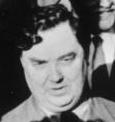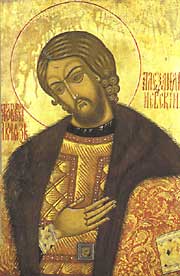Georgy Malenkov
| Georgy Malenkov Гео́ргий Маленко́в |
|
 Official portrait of Malenkov |
|
|
Chairman of the Council of Ministers of the Soviet Union
|
|
|---|---|
| In office March 6, 1953 – February 8, 1955 |
|
| Preceded by | Joseph Stalin |
| Succeeded by | Nikolai Bulganin |
|
First Secretary of the Communist Party of the Soviet Union
|
|
| In office March 5, 1953 – March 13, 1953 |
|
|
Member of the Politburo and Presidium
|
|
| In office 1946–1957 |
|
|
|
|
| Born | 8 January 1902 Orenburg, Russian Empire |
| Died | 14 January 1988 (aged 86) Moscow, Russian SFSR, Soviet Union |
| Nationality | Soviet (Russian) |
| Political party | Communist Party of the Soviet Union |
| Spouse(s) | Valeriya A. Golubtsova |
| Children | 3 |
| Alma mater | Moscow Highest Technical School |
| Profession | Engineer, politician |
| Religion | Russian Orthodox |
Georgy Maximilianovich Malenkov (Russian: Гео́ргий Максимилиа́нович Маленко́в, Georgij Maksimilianovič Malenkov; January 8, 1902 – January 14, 1988) was a Soviet politician, Communist Party leader and close collaborator of Joseph Stalin. After Stalin's death, he became Premier of the Soviet Union (1953-1955) and was in 1953 briefly considered the most powerful Soviet politician before being overshadowed by Nikita Khrushchev.
Contents |
Early life
Malenkov was born at Orenburg, Russian Empire. His paternal ancestors were of noble Macedonian extraction, some of whom had served in the czar's army as officers.[1] His mother was the daughter of a blacksmith and the granddaughter of an Orthodox priest.[2] Malenkov graduated from high school during the revolution and was drafted into the Red Army in 1919. He joined the Communist Party of the Soviet Union (CPSU) in 1920 and worked as a political commissar on a propaganda train in Turkestan during the Russian civil war.[2]
Rise in the Communist Party
After the war, Malenkov returned to his studies and received his engineering degree from the prestigious Moscow Highest Technical School in 1925.[2] Post-graduation he worked in the staff of the Organizational Bureau (Orgburo) of the Central Committee of the CPSU.[2] During the next ten years Malenkov became closely associated with Stalin and was deeply involved in implementing the purging of the party.[2] In 1938 he was one of the key figures in bringing forth the downfall of Yezhov, the head of the NKVD. In 1939 Malenkov became the head of the party's Cadres Directorate, which gave him control over personnel matters of party bureaucracy.[2] During the same year he also became a member and a secretary of the Central Committee and rose from his previous staff position to become a full member of Orgburo.[2] In February 1941 Malenkov became a candidate member of the Politburo.[2]
After the German invasion of June 1941, Malenkov was promoted to the State Defense Committee (GKO), along with Beria, Voroshilov and Molotov with Stalin as the committee's head.[2] This small group held immense power and Malenkov's membership thus made him one of the most powerful men of the Soviet Union. During 1941–1943 Malenkov's primary responsibility in the GKO was aircraft production.[2] In 1943 he became a chairman of a committee that oversaw the economic rehabilitation of liberated areas.[2]
Rise in the Politburo
Named as a candidate for the Politburo, Malenkov joined in 1946. Although Malenkov fell out of favour in place of his rivals Andrei Zhdanov and Lavrentiy Beria, he soon came back into Stalin's favour, especially because of Zhdanov's death. Beria soon joined Malenkov, and both of them saw all of Zhdanov's allies purged from the Party and sent to labour camps. In 1952, Malenkov became a Secretary of the Central Committee. The death of Stalin, in 1953, briefly brought Malenkov to the highest position he would ever hold. With Beria's support, Malenkov became Premier of the Soviet Union, but he had to resign from the Secretariat on March 13 due to the opposition of other members of the Politburo of the CPSU Central Committee. Nikita Khrushchev assumed the position of General Secretary of the CPSU in September, ushering in a period of a Malenkov-Khrushchev duumvirate.
Malenkov retained the office of premier for two years. During these years, he was vocal about his opposition to nuclear armament, declaring "a nuclear war could lead to global destruction." He also advocated refocusing the economy on the production of consumer goods and away from heavy industry, something his successor Nikita Khrushchev (1955–1964) would escalate.

He was forced to resign, in February 1955, after he came under attack for his closeness to Beria (who was executed as a traitor in December 1953) and for the slow pace of reforms, particularly when it came to rehabilitating political prisoners. Malenkov remained in the Politburo's successor, the Presidium.
Together with Khrushchev, he flew to the island of Brioni (Yugoslavia) on the night of November 1-November 2, 1956 to inform Josip Broz Tito of the impending (second) Soviet invasion of Hungary scheduled for November 4.[3]
However, in 1957, he was again forced to resign due to participation in a failed attempt together with Nikolai Bulganin, Vyacheslav Molotov, and Lazar Kaganovich (the so-called Anti-Party Group) to depose Khrushchev. In 1961, he was expelled from the Communist Party and exiled within the Soviet Union. He became a manager of a hydroelectric plant in Ust'-Kamenogorsk, Kazakhstan.[4]
Simon Sebag Montefiore reports in his 2003 Stalin: Court of the Red Tsar that Malenkov found this demotion actually a pleasant relief from the pressures of the Politburo. Furthermore, he reports, in his later years Malenkov converted to Christianity, as did his daughter, who has since spent part of her personal wealth building churches throughout the former USSR.
Contemporary assessments
When, in 1954, a delegation of the United Kingdom's Labour Party - including Clement Attlee and Aneurin Bevan - passed through Moscow on their way to the People's Republic of China, Malenkov gave a dinner at his dacha. Malenkov seemed "easily the most intelligent and quickest to grasp what was being said"; that he said "no more than he wants to say"; that he was an "extremely agreeable neighbour at the table"; that he had a "pleasant, musical voice and spoke well-educated Russian"; and that he even recommended quietly that British diplomat-translator Cecil Parrott should read the novels of Leonid Andreyev - who was at that moment in time, condemned as decadent in the USSR. Khrushchev, by contrast, struck British ambassador Sir William Goodenough Hayter as being "rumbustious, impetuous, loquacious, free-wheeling, alarmingly ignorant of foreign affairs." He "spoke in short sentences, in an emphatic voice and with great conviction… grinning good-naturedly," he often "stumbled in his choice of words" and "said the wrong thing." He seemed "incapable of grasping Bevan's line of thought," which Malenkov had to explain to him in "words of one syllable." Given to "interrupting," he seemed more eager to talk than to listen and understand. He was "quick but not intelligent." Convinced that Malenkov was in charge, no one in the British delegation wanted to be bothered with Khrushchev. Malenkov "spoke the best Russian of any Soviet leader I have heard; his "speeches were well constructed and logical in their development"; he seemed "a man with a more Western-oriented mind."
References
- ↑ Zubok, V.M. & Pleshakov, K., Inside the Kremlin's cold war: from Stalin to Khrushchev, Harvard University Press, 1996, pp. 140: "His ancestors were czarist military officers of Macedonian extraction."
- ↑ 2.00 2.01 2.02 2.03 2.04 2.05 2.06 2.07 2.08 2.09 2.10 Zubok, V.M. & Pleshakov, K., Inside the Kremlin's cold war: from Stalin to Khrushchev, Harvard University Press, 1996, p. 140.
- ↑ Johanna Granville, "Soviet Documents on the Hungarian Revolution, 24 October - 4 November 1956", Cold War International History Project Bulletin, no. 5 (Woodrow Wilson Center for International Scholars, Washington, DC), Spring, 1995, pp. 22–23, 29-34.
- ↑ [1]
Bibliography
- Johanna, Granville, The First Domino: International Decision Making During the Hungarian Crisis of 1956, Texas A & M University Press, 2004. ISBN 1585442984.
- Sebag Montefiore, Simon, Stalin: The Court of the Red Tsar (2003)
Further sources
- "Number 2½", Time, Mar 20, 1950.
| Party political offices | ||
|---|---|---|
| Preceded by Joseph Stalin |
General Secretary of the Communist Party of the Soviet Union 5 March 1953 - 13 March 1953 |
Succeeded by Nikita Khrushchev |
| Political offices | ||
| Preceded by Joseph Stalin |
Premier of the Soviet Union 1953–1955 |
Succeeded by Nikolai Bulganin |
|
|||||
|
||||||||||||||||||||||||||||||||||||||||||||
|
|||||||||

.jpg)